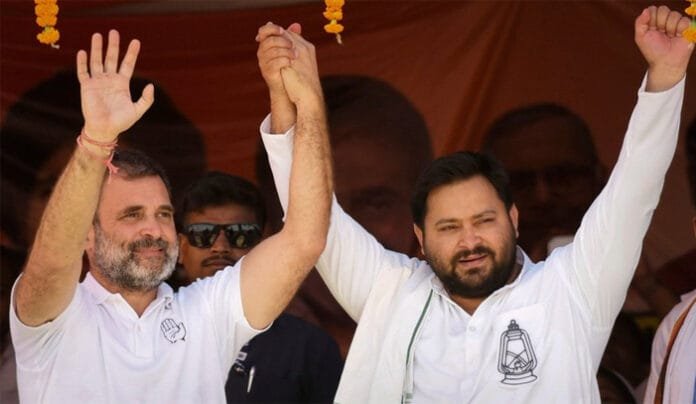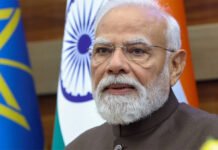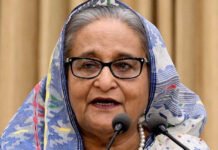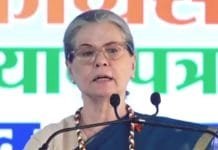Bihar is witnessing widespread disruption today as the India Alliance—led by Leader of Opposition Tejashwi Yadav—launches a massive Chakkajam across the state. The statewide shutdown has brought transportation to a halt, particularly train services in key districts. The protest, aimed directly at the Election Commission of India and the central government, has intensified with roads blocked, trains stopped, and tires set ablaze in multiple locations.
Massive Mobilization by Opposition Across Bihar
From the early hours of Wednesday, RJD, Congress, Left parties, and Vikasheel Insan Party workers flooded the streets of Patna, Darbhanga, Jehanabad, Muzaffarpur, Bhagalpur, Purnia, and Gaya. The opposition’s message is clear: they are demanding electoral transparency, accusing the Election Commission of bias and failure in conducting fair elections.
Train Services Paralyzed in Darbhanga and Jehanabad
In a dramatic escalation, protestors stormed railway stations and physically blocked trains. In Darbhanga, RJD workers climbed onto a Namo Bharat train, effectively halting services for hours. Jehanabad saw similar disruptions as demonstrators sat on railway tracks, bringing the regional rail traffic to a standstill.
Several train routes were either delayed or canceled. Long-distance travelers, students, and daily commuters were stranded. East Central Railway officials confirmed disruptions on multiple lines, triggering chaos at key junctions across the state.
Road Blockades Cripple Movement in Urban and Rural Areas
In Patna, major thoroughfares such as Bailey Road, Gandhi Maidan, and Dak Bunglow crossing were blocked. Protestors formed human chains and burnt tires, creating thick clouds of smoke that choked city streets. Law enforcement struggled to disperse the crowds without escalating tensions.
In Muzaffarpur, students and youth wings of opposition parties blocked National Highway 28. Purnia witnessed similar scenes as tractors and private vehicles were used to blockade arterial roads, affecting supply chains and daily life. Gaya reported arson incidents, where tires were torched at bus terminals, resulting in temporary suspension of interstate transport services.
Police Deployment and Section 144 in Sensitive Zones
With rising tensions and fear of violent outbreaks, the Bihar government has deployed additional Rapid Action Force (RAF) units and paramilitary forces in sensitive areas. In zones considered flashpoints, Section 144 has been enforced, prohibiting assembly of more than four people.
Police officials in Bhagalpur confirmed the detention of several protestors attempting to damage public property. Over 150 arrests were made statewide by noon. However, the opposition accused police of using excessive force, adding fuel to the fire.
Tejashwi Yadav Leads the Charge Against the Election Commission
Tejashwi Yadav, addressing a large gathering at Eco Park, Patna, claimed the Election Commission is no longer an independent body but “an extended arm of the ruling regime.” He asserted that the Lok Sabha election results were tampered with and called for a judicial probe.
He added, “This is not just Bihar’s fight. This is a national movement to protect democracy. The people’s mandate has been manipulated. We will not stay silent.”
Unified Opposition Sends Strong Political Message
The Chakkajam has transformed into a symbol of resistance for the entire India Alliance. Leaders from Congress, CPI, CPI(M), RJD, and VIP have all condemned what they call an “institutional breakdown” and signaled plans for nationwide demonstrations in the coming weeks.
Congress leader Ajit Sharma blamed the central government for “killing democracy” and “misusing institutions like the CBI, ED, and the Election Commission.” The opposition believes today’s protest is the beginning of a broader civil resistance movement.
Economic Impact and Public Reaction
The economic fallout from the Bihar shutdown is already surfacing. Local businesses in Patna and Gaya remained closed, with shopkeepers fearing vandalism. Daily wage workers, auto drivers, and small vendors expressed concern over recurring political instability affecting their livelihoods.
Farmers in Purnia and Araria complained about delayed procurement and supply of essential materials. Meanwhile, public sentiment remains mixed. While some support the opposition’s call for electoral reforms, others are frustrated by the disruptions.
Internet Suspensions and Media Restrictions
To prevent the spread of misinformation and viral videos, mobile internet services were temporarily suspended in Darbhanga, Jehanabad, and Nalanda districts. The state government issued a high-alert advisory to all district magistrates, instructing them to monitor social media closely and detain those inciting unrest online.
Several journalists were stopped from covering the protest near Dak Bungalow, prompting criticism from media unions who termed it a violation of press freedom.
Government Response and BJP’s Counterattack
In a statement issued by Bihar’s BJP president, the ruling party dismissed the protests as “an act of desperation.” They alleged that the opposition is unable to accept electoral defeat and is now disrupting public life to stay relevant.
Union Minister Nityanand Rai said, “The people of Bihar have full faith in democracy. The protest is nothing but political theater, and the administration will take strict action against anyone trying to break the law.”
Upcoming Developments and What to Expect
The opposition has warned of larger protests, including possible Bharat Bandh, if their demands are not addressed. They have also hinted at knocking on the doors of the Supreme Court, demanding a forensic audit of EVM data and postal ballots.
The next 72 hours are crucial. Political observers believe that today’s Chakkajam will be a turning point in Bihar’s political narrative and may influence 2025 Assembly Elections strategy.
Conclusion: Bihar at a Standstill, Political Stakes Soar
Today’s Chakkajam is more than just a roadblock—it’s a powerful political statement. Bihar is witnessing one of its most intense protests in recent years, as opposition parties unite to challenge the authority and credibility of the Election Commission and central government. With public frustration, rising tensions, and nationwide implications, this movement could spark a broader wave of political upheaval.
The India Alliance has thrown down the gauntlet. Whether this mass mobilization translates into tangible political outcomes remains to be seen—but one thing is certain: Bihar’s streets are now the frontline of India’s democratic battle.
















